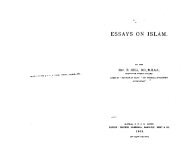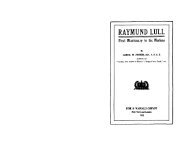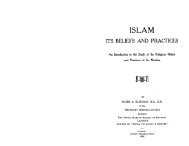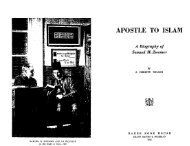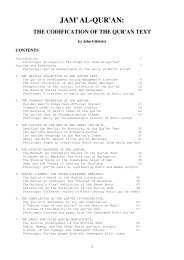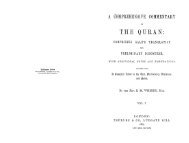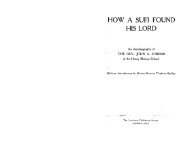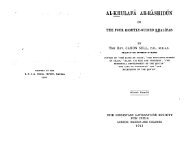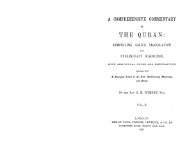Guillaume--Life of Muhammad.pdf - Radical Truth
Guillaume--Life of Muhammad.pdf - Radical Truth
Guillaume--Life of Muhammad.pdf - Radical Truth
You also want an ePaper? Increase the reach of your titles
YUMPU automatically turns print PDFs into web optimized ePapers that Google loves.
702 The <strong>Life</strong> <strong>of</strong> <strong>Muhammad</strong><br />
67. KhauHin was Ibn 'Amr b. al-J:Iaf b. QuQ.ifa; others say Ibn 'Amr b.<br />
Murra b. Udad b. Zayd b. Mihsa' b. 'Amr b. 'Arib b. Zayd b. Kahlan b.<br />
Saba'; others say Ibn 'Amr b. Sa'd al-'Ashira b. Madh\1ij.<br />
68. I shall say morc about him later on, God willing. Daus was the son <strong>of</strong><br />
'Udthan b. 'Abdullah b. Zahran b. Ka'b b. al-l;liirith b. Ka'b b. 'Abdullah<br />
b. Malik b. Nalr b. al-Asd b. al-Ghauth. Others say Daus b. 'Abdullah b.<br />
Zahran b. al-Asd b. al-Ghauth.<br />
69. I shall have more to say about this later on, God ,\villing.<br />
70. Allies <strong>of</strong> the sons <strong>of</strong> Abu Tiilib especially. Sulaym was b. l\Ian~u.r b.<br />
'Ikrima b. Kha~afa b. Qays b. 'Aylan.<br />
7r. These m'O verses were composed by Abu Khirash aI-HudhalI whose<br />
name ,"vas Khuwaylid b. l\lurra, and arc taken from a longer poem. Guardiansl<br />
means those in charge <strong>of</strong> the affairs <strong>of</strong> the Ka'ba. Cf. the lines <strong>of</strong><br />
Ru'ba b. al-'Ajjaj in onc <strong>of</strong> his rajaz poems which I shall say more about<br />
later on God willing:<br />
Nay, by the lord <strong>of</strong> the birds who rest safely<br />
In the victims' enclosure and the overseer's2 house.<br />
72. AI-Kumayt b. Zayd, one <strong>of</strong> B. Asad b. Khuzayma b. l\ludrika, said in one<br />
<strong>of</strong> his odes:<br />
Tribes swore they \vould not flee<br />
Turning their backs on l\lanat.<br />
The apostle <strong>of</strong> God sent Abu Sufyan b. l;Iarb-others say CAly b. Abu<br />
Talib-with orders to destroy it.<br />
73. The name is also spelt Dhu'l-Khulu~a. A certain Arab said:<br />
If you, Dhu'l-Khulu;;a, were the avenger <strong>of</strong> blood<br />
As I, and your father had been slain,<br />
You would not forbid the killing <strong>of</strong> enemiest<br />
His father had~been killed and he wanted to tak:: vengeance; but first he<br />
'\-vent to DhQ 'l-Khala~a to get an oracle from the arrows. \Vhcn the arrow<br />
forbidding him to proceed came out he spoke the verses quoted above.<br />
Some attribute them to Imru'u'!-Qays b. ~ujr al-Kindi. The apostle <strong>of</strong><br />
God dispatched Jarir b. 'Abdullah al-Bajali to destroy the idol.<br />
74. I was told by a traditionist that the apostle <strong>of</strong> God sent CAli b. Abu<br />
Talib to destroy it, and he found there nvo swords called al-RasQb and al<br />
1\1ikhdham. \Vhen he brought them to the apostle <strong>of</strong> God he gave them<br />
back to him. They are in fact the nyo swords which 'Ali had.<br />
75. r have gi'\'C11 an account <strong>of</strong> it in the preceding pages.<br />
76. The second half <strong>of</strong> the verse was uttered by a man <strong>of</strong> B. Sa'd. It is<br />
said that al-l\'lustaughir b. Rabi'a b. Ka'b b. Sacd lived 330 years. He, who<br />
lived longer than any man <strong>of</strong> l'vluqar, said:<br />
I<br />
I am weary <strong>of</strong> life and its length.<br />
I have lived for hundreds <strong>of</strong> years.<br />
Sadana.<br />
2 Masdan.<br />
A century was followed by nvo more.<br />
From countless months I have added to my years.<br />
What remains is as what went before.<br />
Days pass and nights follow them.<br />
However, some people ascribe these verses to Zuhayr b. Janab al-Kalbi. 1<br />
77. This is really a verse <strong>of</strong> al-Aswad b. Ya'fur al-Nahshal1, :0:ahshal being<br />
the son <strong>of</strong> Darim b. Malik b. l,Ianz;ala b. ::Ylalik b. Zayd I\1anat b. Tamim.<br />
Abu Mu1).riz Khalaf al-Abmar quoted the verse to me in the fom1:<br />
The people <strong>of</strong> al-Khawarnaq and al-Sadir and Bariq<br />
And the temple Dhu'l-Shurufar <strong>of</strong> Sindad. 2<br />
78. It is said that anything that she gives birth to after that belongs to their<br />
sons and not their daughters.<br />
79. All this information according to the Bedouin is wrong, except so Jar<br />
as concerns the l;Iaml; there Ibn Is1).aq is right. Among the Arabs the Bal:l1ra<br />
is the she-camel whose ear is slit and \vho is not ridden, whose hair is not<br />
shorn and whose milk is only drunk by the guest or given in alms, or left to<br />
their gods. The Sa'iba is a she-camel which a man vows that he will set free<br />
if he recovers from his sickness or if he gains an object which he sed:s; and<br />
when he has freed a she-camel or a camel for one <strong>of</strong> their gods, then it runs<br />
free and pastures, no pr<strong>of</strong>it being made from it. The \Va,,?Ila means a e\ve<br />
whose mother has twins at every birth. Its owner gives the ewes to his gods<br />
and keeps the males for himself. If her mother gives birth to a male lamb<br />
with her, they say Wa$alat (she has joined) her brother, and her brother is<br />
freed with her, no pr<strong>of</strong>it being made from him. I was given this information<br />
by YQnus b. J:Iabib the grammarian and others, each contributing his part<br />
thereto.<br />
80. The poet says:<br />
Ibn Hishiim's Notes<br />
Round the Wa~Ila in Shurayf is a three-year-old camel,<br />
And those whose backs are taboo and those who are set free. 3<br />
Tamim b. Ubayy b. 1\Iuqbil, one <strong>of</strong> B. 'Amir b. $aC~a'a, said:<br />
Therein is the rumbling <strong>of</strong> the young onager stallion<br />
Like the grumbling <strong>of</strong> the Diyafi camel in the midst <strong>of</strong> the Ba1;iras.<br />
This verse belongs to one <strong>of</strong> his odes and the plural <strong>of</strong> Bab'ira is Ba(ui'ir<br />
and Bubur. The plural <strong>of</strong> War'ila is Wara'it and TVllru1. The plural <strong>of</strong><br />
multitude <strong>of</strong> Sa'iba is Sawa'ib and Suyyab, and the plural <strong>of</strong> multitude <strong>of</strong><br />
ijamf is ijawamf.<br />
81. And the Khuz:l'a say we are the sons <strong>of</strong> cAmr b. RabI'a b. Haritha b.<br />
cAmr b. 'Amir b. I:Iarith~ b. Imru'u'l-Qays b. Tha'laba b. IVLlzin b.' al-Asel b.<br />
al-Ghauth; and Khindif is their mother, according to what Abu 'Ubayda<br />
and other learned traditionists told me. Others say Khuzaca are the sons <strong>of</strong><br />
I These verses (with unimportant variants) are in K. al-Alu'ammarin, ed. Gold7.iher,<br />
Leiden, 1899,1\'0. X and p. 7.<br />
2 One's confidence in Ibn Hisham is not strengthened by this quotation. However,<br />
it is to be noted that he does not claim that this notorious forger's version is tu be preferred.<br />
3 These lines contain all three terms.<br />
7°3



